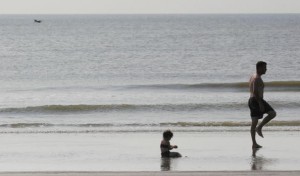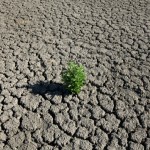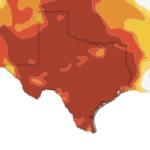Drought Possible Culprit in Massive Fish Kill on Gulf Coast

Photo by Dave Einsel/Getty Images
A father and daughter play on the beach in Galveston in 2005. A red tide in Galveston Bay is causing dead fish to wash up on shore this week.
Researchers suspect drought is the cause of a massive fish die off in the Galveston Bay where millions of shad, also known as skipjack, have washed ashore there in recent days. They’ve been found primarily around the communities of Kemah and Seabrook.
“We’ve never seen one to this scale in this location,” Texas Parks and Wildlife Biologist Heather Biggs told KUT’s Nathan Bernier. Though she said that it’s “very common to have fish kills within tributaries throughout the bay system due to low dissolved oxygen.”
Biggs says the cause is apparently the drought. Researchers suspect a lack of rainwater runoff into Galveston Bay resulted in oxygen-depleted waters, which caused the fish to die.
“When you have more runoff, you have more turbidity in the water, and you have more mixing in the water and so you have more oxygen,” Biggs said.
“At this point, we feel like it is due to low dissolved oxygen in the water,” she said.
When asked if the fish kill might have anything to do with an oil spill in March that left a 12-mile long oil slick in Galveston Bay, Biggs says it was “very unlikely” that was related to the fish dying.
In recent years, lower freshwater inflows along the Gulf Coast have contributed to other fish kills. In 2012, an algae bloom drained oxygen from water around Galveston. It was thought that the drought could have exacerbated that die-off as well. Drought was also blamed for the partial cancellation of oyster harvesting that year.
According to the U.S. Geological Survey, fish kills will likely become more common in Texas due to climate change.
The current incident in the Galveston Bay may be receiving more attention than usual because it has disrupted the plans of some visitors who arrived to enjoy Memorial Day weekend.
“It does have an odor like dying fish or dead fish. The crabs are loving it, and the birds are loving it,” said Biggs.


